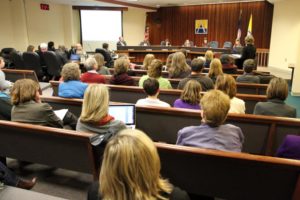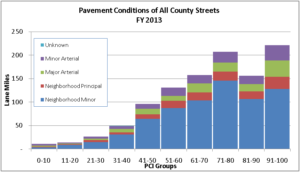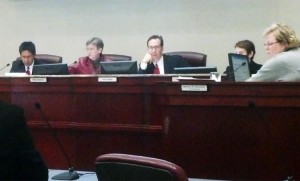 A local civic activist is calling for Arlington to improve its internal financial auditing, lest more spending snafus fall through the cracks.
A local civic activist is calling for Arlington to improve its internal financial auditing, lest more spending snafus fall through the cracks.
Suzanne Smith Sundberg, a member of the Arlington County Civic Federation Revenues and Expenditures Committee, has written an eight page report detailing what she characterizes as a lack of audit oversight over the county’s finances.
The county eliminated two internal auditing positions during budget cuts in 2010, Sundberg writes, a move that raised red flags with her committee at the time. Recent news items have supported their concern and point to need to create a permanent internal auditing office, she says.
“Recent events in Arlington County — mounting discontent over the ongoing taxpayer support devoted to keeping the Artisphere afloat, taxpayers’ demonstrated opposition to the Columbia Pike streetcar at the recent town hall, and the public outcry over the eye‐popping $1 million price tag for a single bus Super Stop — provide clear evidence that citizens are losing confidence in their local government and its ability to utilize resources in an efficient, effective, and practical manner,” Sundberg writes.
The county employs an external auditing firm, CliftonLarsonAllen. Sundberg, however, pointed to the case of an Arlington County employee convicted of embezzling $12,000 from the county fair as evidence that external auditing is not comprehensive enough to catch many financial irregularities.
County Manager Barbara Donnellan has included $250,000 in one-time funds for “an internal audit function in the Department of Management and Finance” in her proposed FY 2014 budget — still subject to County Board approval — but Sundberg says that doesn’t go far enough.
“Although it’s a welcome step in the right direction, the County Manager’s proposal in her FY 2014 budget is vague and appears insufficient to support the establishment of a robust, permanent internal audit function in Arlington County,” she writes. “No effective internal audit function can ever be established if it is treated as an afterthought, subject to elimination or significant reduction when money is tight. In fact, the most advantageous time to have a strong, independent audit function is during economic downturns when difficult choices must be made and every dollar counts.”
Sundberg suggests that Arlington look to Fairfax County or Montgomery County for examples of effective internal auditing mechanisms.
Fairfax County has two separate internal auditing offices. Montgomery County created an Office of the Inspector General in 1997. Sundberg cites data suggesting that both counties save millions of dollars annually thanks to their internal controls. Arlington, she says, should do the same.
“If Arlington County cannot or will not provide sufficient resources, authority, and independence to sustain a robust and permanent internal audit function, then the establishment of an office of inspector general or special independent auditor — or whatever statutory option may be available — is all the more necessary,” she writes.
Sundberg’s report represents her own analysis and opinion. It has not been endorsed by the Civic Federation.
 The Arlington School Board approved a 4 percent raise for Superintendent Dr. Patrick Murphy on Monday.
The Arlington School Board approved a 4 percent raise for Superintendent Dr. Patrick Murphy on Monday.










